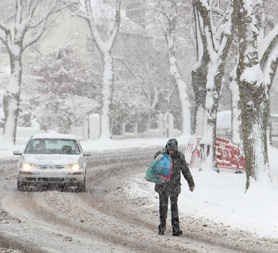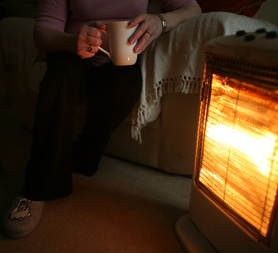Heating oil: No rationing plans say Ministers
As more snow falls across the UK, distributors tell Channel 4 News demand for heating oil is two or three times the seasonal norm, as the Government denies it is planning to introduce rationing.

The Department of Energy and Climate Change (DECC) said it has been holding discussions with the heating oil industry over the last 24 hours.
“We are not introducing rationing for heating oil; the industry supply operations are already highly efficient and the industry has indicated that such a step would not help to alleviate the situation,” a DECC spokesperson said.
However, the DECC admitted that “if the weather gets worse all options will be considered”.
Increasing oil prices and restricted deliveries have already left some families without fuel, and the Government has warned the situation could become “very serious” if the cold weather persists. Some homes are having to wait for almost a month for oil to be delivered.
Concern was sparked yesterday, when the Government suggested it was talking to oil suppliers about rationing.
The Energy and Climate Change Secretary, Chris Huhne, said: “The Energy Minister has been in constant discussions looking at any way in which those who need heating oil, and are short of heating oil, get it. That is absolutely essential.”
We are not introducing rationing for heating oil; the industry supply operations are already highly efficient and the industry has indicated that such a step would not help to alleviate the situation. DECC
It is estimated that 660,000 homes – many in remote areas – as well as thousands of public buildings, including schools and hospitals, rely on oil for their heating.
Delivery problems
The trade association, the Federation of Petroleum Suppliers (FPS) – which represents more than 80 per cent of oil distribution companies in Britain – told Channel 4 News that one reason there has been a problem delivering heating oil has been the unusually high order levels, which are two or three times the seasonal norm.
“Because of the early onset of winter weather and some issues at that time with supply from terminals, due partly to the unexpectedly high demand, current backlogs are up to 20 working days in some parts of Scotland. In England and Wales, the backlogs are still up to 10 days in some areas,” an FPS statement said.
It also said that the recent heavy snowfall is adding to problems with deliveries.
“The recent conditions reduced productivity to 30-40 per cent of normal in some areas. One vehicle in South Yorkshire took five hours to make a single delivery. Another in Scotland achieved only three out of 14 scheduled deliveries that day. If the weather causes any more adverse road conditions, these backlogs may unfortunately increase.”
The Energy Minister, Charles Hendry, said that the industry is targeting deliveries to vulnerable consumers, and those whose heating oil supplies are running low.
Impact on rural areas
Graham Biggs, Chief Executive of the Rural Services Network, an organisation aimed at improving services in rural communities, told Channel 4 News that heating oil delivery is a big problem.
“Rural areas, in the main, are not connected to the gas network, and they also often have old properties which are difficult to insulate.
“People often have to fall back on other forms of heating. They may have an immersion heater for hot water in an emergency, and a solid fire in at least one room, so at least they can try to keep warm.”
He added that pressures which have led to the price rise in heating oil have also affected petrol and diesel.
“You end up with a situation in rural areas that people, who already receive substantially lower wages that their urban counterparts, have to spend more of it on fuel to heat their homes, or for transport.”

“The Government has also provided a temporary relaxation of regulations governing drivers’ hours, which will give them an extra hour a day to help make up backlogs and meet demand.
“Clearly, current levels of demand for heating remain high and the government would like to emphasise that a prudent approach towards the ordering of home heating fuel will help the industry to meet the demand of those most in need.”
Price rise
In the last month, prices have jumped from under 40 pence a litre of oil, to more than 70 pence in some cases. Mr Hendry said he has spoken to the Office of Fair Trading (OFT) about this.
“The enforcement of competition consumer law is a matter for the OFT,” he said.
“They have assured me that they are keeping a very close eye on the situation and are keen to receive evidence from members about any market abuse they are experiencing.”
The OFT told Channel 4 News it will consider any evidence put forward, and in a statement said: “We understand that in these very cold weather conditions, consumers are struggling with high heating oil prices. There are many factors that can influence the retail price.
“For the OFT to investigate the issue under the Competition Act 1998, we would need some evidence of agreements between suppliers if collusion is alleged, or evidence of an abuse of dominance.
“For the OFT to investigate a breach of consumer law, we would need evidence of unfair contract terms or unfair trading. High prices in themselves are not an indication that either competition or consumer law has been breached.”
The current circumstances are not normal, but we hope normality returns rapidly. Federation of Petroleum Suppliers
The FPS said it could not comment on particular allegations, but that there were a number of factors which had influenced the high prices that consumers were experiencing.
It said these included the price of crude, the dollar to sterling exchange rate and the fact that the UK does not produce sufficient kerosene (heating oil) from its refineries, so that also has to be purchased as a finished product and is therefore subject to price changes.
In a statement, the FPS said: “The recent bad weather has caused problems for distributors in obtaining kerosene. Order levels have been twice the seasonal norm. Distributors have had to go further afield to collect product.
“There have been queues of tankers at the terminals waiting to load. Drivers have to be paid for queuing time and also for the time spent going further afield to collect product.
“It is a highly competitive market and consumers get a really good deal in normal circumstances. The current circumstances are not normal, but we hope normality returns rapidly.”
-
Latest news
-
‘It was hard not to laugh on set’ – Swede Caroline lead on root vegetable mockumentary5m

-
Teachers to be allowed guns in Tennessee schools5m

-
Tory MP defects to Labour over NHS ‘chaos’2m

-
Al Sharpton on US campus wars and the US election race between ‘two old white men’5m

-
Israel-Gaza war continues to fuel protests and division in US, France and UK4m

-




